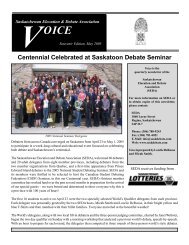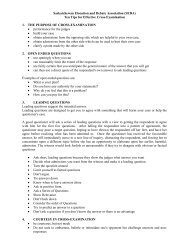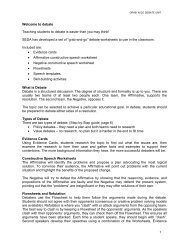Human Cloning - Saskatchewan Elocution and Debate Association
Human Cloning - Saskatchewan Elocution and Debate Association
Human Cloning - Saskatchewan Elocution and Debate Association
You also want an ePaper? Increase the reach of your titles
YUMPU automatically turns print PDFs into web optimized ePapers that Google loves.
Seeing Double: The <strong>Cloning</strong> Conundrum Page 4 of 8<br />
Canadian Speeches, November-December 2002<br />
how to switch cells on <strong>and</strong><br />
off, enabling them to cure<br />
cancer. It will also help them<br />
underst<strong>and</strong> why cancerous<br />
cells lose their differentiation<br />
<strong>and</strong> divide at a faster rate.<br />
• Leukemia. <strong>Cloning</strong> bone<br />
marrow for children <strong>and</strong><br />
adults suffering from<br />
leukemia is expected to be<br />
one of the first benefits<br />
reaped from cloning<br />
technology.<br />
• Cystic fibrosis. There is a<br />
strong possibility that<br />
scientists may be able to<br />
produce effective genetic<br />
therapy against cystic<br />
fibrosis. Ian Wilmut <strong>and</strong><br />
colleagues are already<br />
working on this.<br />
• Spinal Injury. Christopher<br />
Reed, the paralyzed film<br />
actor who played the title role<br />
in a Superman movie, is<br />
among those urging research<br />
on growing nerves or spinal<br />
cords for paralyzed people to<br />
regain control of movement.<br />
None of these possible treatments<br />
have been tested on humans yet,<br />
but Dr. Robert Lanza, working<br />
with ACT, created working<br />
artificial kidneys from cells taken<br />
from cloned cow embryos. The<br />
kidneys were implanted into the<br />
cow whose DNA generated the<br />
clone <strong>and</strong> were not rejected. The<br />
cow is alive <strong>and</strong> healthy today.<br />
The other treatment possibilities<br />
are not yet confirmed, <strong>and</strong> some<br />
skeptics say they are unlikely to<br />
develop many of these treatments<br />
for humans.<br />
DEFINING INDIVIDUALITY BY<br />
GENETICS<br />
<strong>Cloning</strong> cells to treat illness is<br />
one thing: cloning a whole person<br />
is an entirely different matter. The<br />
physical health risks to clones are<br />
of dire concern, as are the<br />
potential psychological harms to<br />
cloned children. The most<br />
frequent fear voiced by<br />
psychologists is the possible loss<br />
of a sense of uniqueness <strong>and</strong><br />
individuality. Reproductive<br />
cloning creates serious issues of<br />
identity <strong>and</strong> forces society to reevaluate<br />
how we define<br />
ourselves. Gilbert Meilaender, in<br />
his testimony before ANBAC on<br />
March 13, 1997, commented on<br />
the importance of genetic<br />
uniqueness:<br />
"Our children begin with a kind<br />
of genetic independence of us,<br />
their parents. They replicate<br />
neither their father nor their<br />
mother. That is a reminder of<br />
their independence..."<br />
Reproductive cloning would<br />
create a genetic twin separated<br />
only by time. With the identical<br />
appearance of a person that has<br />
already lived, expectations for<br />
this twin could be very high. If<br />
one was to clone Albert Einstein,<br />
people would expect the clone to<br />
be a scientific genius, <strong>and</strong> he<br />
would always be forced to<br />
compare him or herself to his<br />
genetic predecessor's<br />
accomplishments, some argue.<br />
However, this argument<br />
disregards the natural phenomena<br />
of many identical twins, who<br />
grow up to have distinctly<br />
different personalities, with no<br />
serious psychological harm<br />
because of their identical DNA.<br />
Others say that the concept that a<br />
clone is less unique, less distinct,<br />
<strong>and</strong> less in control of his or her<br />
own destiny discriminates against<br />
not only potential clones, but also<br />
naturally-identical twins.<br />
But philosopher Hans Jonas feels<br />
differently on the subject of<br />
twins. Jonas argues that human<br />
cloning, where there is a time gap<br />
between the genetically identical<br />
individuals, <strong>and</strong> the simultaneous<br />
beginning of life for naturally<br />
identical twins are fundamentally<br />
different. Naturally-identical<br />
twins grow up at the same time,<br />
each unaware of the other<br />
person's future life choices. This<br />
ignorance of what their genetic<br />
counterpart's life choices will be<br />
gives them a future where they<br />
are free to choose their own<br />
direction in life. However, if a<br />
twin is later created by cloning, it<br />
grow up with the knowledge of<br />
what place their older twin had in<br />
the world, <strong>and</strong> a sense that its life<br />
has already been played out. This<br />
later twin, Jonas claims, would<br />
lose his sense of spontaneity <strong>and</strong><br />
the authenticity of becoming a<br />
unique self. Jonas claims that it is<br />
tyrannical <strong>and</strong> cruel for the earlier<br />
twin to try <strong>and</strong> determine<br />
another's fate this way.<br />
Even if the later twin did not<br />
believe in genetic determinism,<br />
<strong>and</strong> led a life of its own, it would<br />
still be haunted <strong>and</strong> influenced by<br />
the life of its predecessor. Its life<br />
might be shaped by its<br />
predecessor in ways that other<br />
lives are not, because other lives<br />
are genetically unique.<br />
All these theories are quite<br />
speculative, <strong>and</strong> are directly<br />
related to cultural values. The<br />
psychological effect of growing<br />
up a clone is highly<br />
circumstantial, <strong>and</strong> subject to<br />
many uncertainties.<br />
A concern voiced by many is the<br />
legal <strong>and</strong> social status of a cloned<br />
child in the family structure. For<br />
some, the contrast between the<br />
child's genetic <strong>and</strong> social identity<br />
is a threat to the family structure.<br />
Questions about a cloned child's<br />
place in the family will not be<br />
easily answered. Because its<br />
genes will be identical to the





